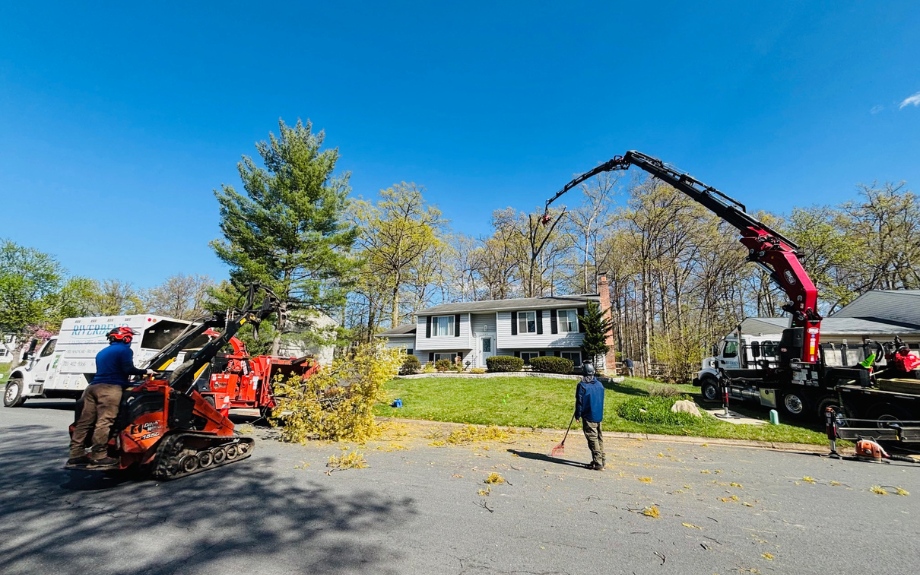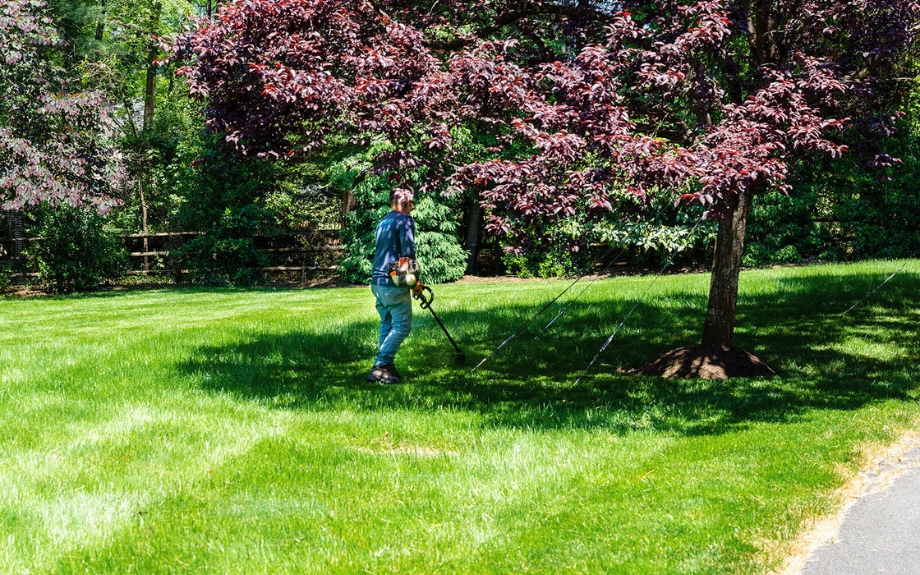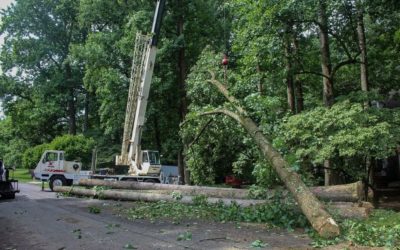Blog Topics
When your valuable mature trees in Great Falls need pruning or that massive oak in McLean requires a risk assessment, who should you call? While both Certified Arborists and general landscaping companies work with trees, the differences in training, equipment, and expertise can mean the difference between healthy, thriving trees and costly mistakes that compromise your property’s safety and value.
Here at Riverbend, we provide both tree care and landscaping services. However, we consider ourselves a tree company that excels in tree care and landscaping, rather than a landscaping company that also does “tree work.” To achieve that goal, we have a team of Certified Arborists who are qualified, licensed, and up-to-date on the latest tree care practices. We not only make your property look beautiful, but we also help to keep your trees healthy, safe, and thriving.
Key Takeaways
- ISA Certified Arborists undergo specialized education and must maintain ongoing credentials that general landscapers aren’t required to have.
- Professional tree care companies utilize specialized equipment including cranes, aerial lifts, and diagnostic tools that protect your property during complex tree work.
- Each jurisdiction in Northern Virginia has distinct tree regulations that require expert knowledge for proper compliance.
- Tree health management involves scientific diagnosis, treatment protocols, and preventive care beyond basic maintenance.
- Risk assessment qualifications, like TRAQ, provide standardized evaluation of hazardous trees to protect your family and property.
What’s the Difference Between Certified Arborists and General Landscapers?
When it comes to tree care, not all professionals are created equal. The title, “Certified Arborist,” represents a higher standard of training, safety, and scientific understanding – while general landscapers focus more on lawn and garden maintenance. The comparison table below highlights the biggest differences in expertise, equipment, and approach to tree care.
| Aspect | Certified Arborist | General Landscaper |
|---|---|---|
| Training | ISA-certified: requires formal education, testing, and continuing education | No standardized certification or tree-specific education required |
| Equipment | Specialized tools (cranes, air spades, resistographs) for safe and precise tree care | Basic lawn/landscape equipment (chainsaws, ladders) |
| Focus | Tree health, risk assessment, and scientific diagnosis | Aesthetic maintenance and general yard care |
| Regulations | Knowledgeable about permits, codes, and local tree laws | Typically not trained in regional tree compliance |
| Insurance | Specialized liability insurance for tree work | General landscaping insurance (often lower coverage) |
| When to Hire | Tree removal, pruning, risk assessments, plant health care | Lawn care, planting beds, basic trimming |
The International Society of Arboriculture (ISA) certification represents the gold standard in tree care professionalism. To become an ISA Certified Arborist, professionals must have at least three years of full-time arboricultural experience and pass a comprehensive 200-question examination covering tree biology, soil science, pruning techniques, risk assessment, and urban forestry principles.
Meanwhile, Virginia has no state licensing requirements for tree work, meaning anyone with a chainsaw can advertise tree services – even without formal training or verified expertise.
Do Certified Arborists Have Higher Standards for Training and Education?
ISA Certified Arborists must complete continuing education units to maintain certification, ensuring they stay current with the latest research, techniques, and safety protocols.
This advanced training matters when your century-old oak shows signs of stress or when your property has hazardous trees that require expert evaluation. The difference isn’t just in knowledge. Instead, it’s about understanding the science behind tree health and applying proven methodologies rather than relying on guesswork.
Many landscapers only have a basic understanding of trees and have no requirements for continuing their education.
“The depth of knowledge required for proper tree care goes far beyond what most people realize. When you’re dealing with 100-year-old oaks worth thousands of dollars, you need someone who understands tree biology, disease diagnosis, and proper pruning techniques. Not just someone who knows how to operate a chainsaw.” – Logan Jones, Owner of Riverbend Tree Service

Specialized crane equipment allows Certified Arborists to safely remove large trees near structures.
What Specialized Equipment Do Arborists Have Access to?
Professional tree services employ specialized equipment that allows for precise, safe tree work in challenging environments:
- Bucket trucks and cherry pickers that safely elevate arborists to work at great heights
- Cranes for controlled removal of large limbs and trunks in confined spaces
- Specialized rigging equipment that prevents property damage during removals
- Ground protection mats that prevent landscape damage from heavy equipment
This equipment represents a significant investment but allows professional tree services, like Riverbend, to safely complete complex projects that would be impossible or extremely dangerous using just ladders and chainsaws. Our crane tree removal services demonstrate how specialized equipment makes all the difference in protecting your property.
What Services Can Only Arborists Provide?
While landscapers are able to expertly handle lawn cutting and edging, they can’t match the extent of services provided by arborists.
Tree Risk Assessments
Tree risk evaluation is a specialized discipline that combines arboricultural knowledge with structured assessment methodology. The ISA’s Tree Risk Assessment Qualification (TRAQ) credential represents advanced training in this critical safety area.
Arborists with TRAQ certification follow a standardized process to evaluate tree risk that includes:
- Target Analysis: Identifying people or property that could be harmed if the tree fails
- Site Factors: Evaluating soil conditions, exposure, and drainage that impact tree stability
- Tree Health Factors: Assessing visible and hidden decay, structural defects, and disease
- Load Factors: Evaluating how wind, snow, and other environmental forces impact risk
- Failure Likelihood: Categorizing risk as improbable, possible, probable, or imminent
This methodical evaluation provides property owners with clear information about actual risk levels rather than vague assessments. The Virginia Department of Forestry specifically recommends finding an ISA Certified Arborist to evaluate storm-damaged trees, when stability concerns are highest.
Only arborists with TRAQ certification can identify subtle indicators of tree failure that aren’t visible to untrained observers, helping you make informed decisions about trees that might pose risks to your family or property.
PRO TIP: A member of the Riverbend Team, Peter Hart, is a Board Certified Master Arborist with TRAQ credentials. Learn more about the experts we employ on our about us page.

Plant health care requires specialized knowledge and equipment that general landscapers typically don’t possess.
Tree Health Management
Tree health management, a core service that distinguishes Certified Arborists from general landscapers, requires specialized tools and equipment for science-based care:
- Resistograph drilling equipment to detect internal decay non-invasively
- Soil testing kits for nutrient and pH analysis
- Trunk injection systems for targeted disease and pest treatment
- Air spades for zone management, soil decompaction, and vertical mulching
- Professional-grade sprayers for precise application of treatments
- Soil testing to identify nutrient deficiencies
- Microbial inoculations to improve soil biology
- Application of specialized biostimulants, including beneficial bacteria, humic acid extracts, and natural growth promoters
These specialized tools allow Certified Arborists to accurately diagnose issues, develop targeted treatment plans, and monitor tree health with precision that isn’t possible with basic landscaping equipment.
Integrated Pest Management (IPM)
Certified Arborists practice Integrated Pest Management (IPM), a holistic approach that:
- Identifies specific pests and pathogens through accurate diagnosis
- Establishes monitoring protocols and treatment thresholds
- Selects the least toxic, most targeted treatment options
- Preserves beneficial insects and natural predators
- Creates sustainable management strategies
This ecological approach contrasts sharply with indiscriminate “spray and pray” methods that can harm beneficial organisms and create chemical dependency. Landscapers don’t have the tools or knowledge to provide these intense services.
Professional Tree Pruning
Professional pruning is both an art and a science that directly impacts tree health, structure, and aesthetics. ISA Certified Arborists follow ANSI A300 standards that specify:
- Proper timing for different species and conditions
- Correct cut placement to promote wound closure
- Appropriate branch selection and removal percentage
- Species-specific pruning techniques
- Structural pruning for young trees to prevent future problems
These standards ensure that pruning enhances tree health rather than creating stress, disease entry points, or structural issues that lead to costly problems later. Most homeowners and landscapers often make cuts without fully understanding how they will impact the tree years down the road.
PRO TIP: For more information about how to find a reputable pruning service, see our previous article on the topic.
How Do Arborists Help With Regulation Compliance?
Each jurisdiction in Northern Virginia has distinct regulations governing tree work, with important differences you should understand before any project begins:
- Fairfax County: Requires permits for land disturbance over 2,500 square feet, with specific tree conservation ordinances that vary by property type. Hazardous tree removal has documentation requirements, particularly when trees pose public safety risks.
- Loudoun County: Enforces specific tree save regulations that vary by development type and location. Properties in designated districts require forest management plans prepared by Professional Foresters or Certified Arborists for tree removal.
- Washington, DC: Maintains some of the region’s strictest tree protection laws. Trees with circumferences of 44-99.9 inches are designated “Special Trees” requiring permits for removal, while “Heritage Trees” (100+ inches circumference) cannot be removed except under specific circumstances.
Our ISA Certified Arborists understand these complex regulatory environments and help ensure your tree work remains in full compliance while meeting your property goals. This expertise extends to creating tree protection plans during construction projects, where understanding specific code requirements is essential.

Professional arborists are able to provide safe emergency tree removal backed with insurance to protect property owners in the event of any accidents.
What Emergency Response Capabilities Do Professional Tree Services Provide?
Professional tree services maintain emergency response teams equipped to handle storm-damaged trees safely. This includes:
- 24/7 emergency response protocols for high-risk situations
- Specialized equipment for handling partially fallen or unstable trees
- Risk assessment of remaining trees after storm events
- Coordination with utility companies and emergency services
- Comprehensive insurance coverage for high-risk work
Storm damage scenarios are particularly dangerous because partially failed trees are unpredictable and can cause serious injury. Professional arborists have the training, equipment, and insurance to handle these situations safely.
PRO TIP: Certified Arborists carry robust liability insurance specifically for tree work, with coverage typically starting at $1 million. General landscapers often carry minimal liability insurance that may be insufficient for tree-related accidents, potentially leaving homeowners exposed to liability.
Frequently Asked Questions About Choosing Tree Care Providers
Do I really need a Certified Arborist for basic tree maintenance?
For valuable mature trees, professional care makes a significant difference in long-term health. While simple jobs on small trees might not require certification, improper pruning of established trees can create lasting damage and increase susceptibility to disease and insects.
How often should I have my trees assessed by a Certified Arborist?
We recommend professional assessments every 1-3 years for established landscapes, with more frequent inspections for trees showing signs of stress or those in high-risk locations near structures.
What should I look for when hiring a tree service company?
Key qualifications include:
- ISA Certified Arborists on staff
- Membership in professional organizations like TCIA
- Proper insurance (both liability and workers’ compensation)
- Detailed written estimates
- References from similar projects
Can landscapers handle emergency storm damage?
Emergency storm damage requires specialized equipment, training, and experience that most landscapers don’t possess. The unpredictable nature of partially failed trees makes this work particularly dangerous for untrained crews.
Choose Professional Tree Care for Your Northern Virginia Property
When your valuable trees need professional care, the choice between a Certified Arborist and a general landscaper can significantly impact both your trees’ health and your property’s safety. At Riverbend Tree Service, our ISA Certified Arborists bring specialized knowledge, professional equipment, and comprehensive tree care expertise to every project throughout Fairfax, Loudoun, and Montgomery Counties.
Don’t risk your investment in mature trees or compromise your family’s safety with inadequate tree care. Call Riverbend Tree Service today at 703-402-9366 or request an estimate online to schedule a consultation with our certified professionals. We’re here to help you make informed decisions about your trees’ health and your property’s safety.
Give Us a Call at 703-402-9366
If you'd like help with your trees or landscape, have any questions, or would like to schedule an appointment with one of our Certified Arborists, please give us a call. We'd love to hear from you!



